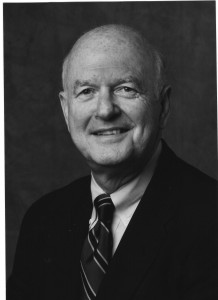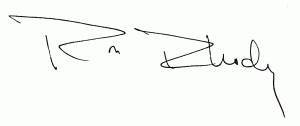This post is part of The Plank Center’s Legacies from Legends in PR Series that was begun in recognition of the 40th Anniversary of the Public Relations Student Society of America in 2007.
A 30-year career spans duty as the chief public relations officer for two Fortune 500 companies and his own consultancy. Previously worked as a daily newspaper reporter and editor and a broadcast newsman. Author of the “CEO’s Handbook;” co-author of “Wordsmithing: The Art & Craft of Writing for Public Relations.” Recipient of the Arthur W. Page Society’s Hall of Fame Award (1996).
I’ve always thought that the highest praise a person can be given is to be known by his peers as a “pro” – as someone who knows what to do, knows how to do it with exquisite skill and gets it done cleanly, under pressure and when it counts, without a lot of fanfare or arm waving. That’s what you in PRSSA, I hope, are on your way to becoming: professionals.
Don’t be put off by the game imagery. In a very real sense this is a game – one of the most difficult and demanding games imaginable. Its goal is to affect human behavior. It focuses on the most unpredictable and unmanageable off all subjects – the human mind and emotions. It relies for success on the most difficult of human activities – communications. It is a hard game. The stakes are high. There are winners and losers. It is exciting, challenging, demanding and, for people with the talent and drive to play it well, the best game in town.
If you’re reading this, I assume you’re one of them. If so, there are lessons from the recent past I hope you’ll keep in mind as you go about the play of the game.
Among the major lessons is that our responsibilities are broader than we once thought they were.
We’ve learned, I believe, that our organizations have a positive duty to inform. All those who are touched by our actions have a right to know what we’re doing and how it affects them. Our institutions and businesses have a responsibility to provide not just the disclosures required by law, but the clear and complete information people need to allow them to make informed decisions, in their own self-interest, about our performance and our actions. Nothing less is acceptable in the world we operate in now.
But perhaps most importantly, we learned that Arthur Page was right. Page, an early AT&T executive who was a pioneer in our field, contended that, “All business in a democratic society begins with public permission and exist by public approval.” The successful corporation, he believed, had to operate in the public interest, manage for the long run and make customer satisfaction its primary goal. “The successful business must,” he said, “conduct itself in such a way that the public will give it sufficient freedom to serve effectively.”
All organizations exist and prosper only at the pleasure of the publics they serve. They earn the public’s support only by operating responsibly and acting fairly. Managements that are out pillaging the countryside are going to be crucified and should be.
The way to avoid such a fate is to do the right thing – as the public defines the right thing. There is nothing really difficult involved: Provide quality products and services, sell them at fair prices, pay your people a reasonable wage and treat them with respect, don’t endanger human life or disregard the environment, pay your taxes, be honest, operate ethically. The only real impediments to such conduct are greed and arrogance. Don’t get trapped by them.
And do keep in mind one fundamentally important fact: yours, as a public relations professional, is a singular responsibility.
What you do, when you do it right, makes a real difference. It makes a difference in what people know, think and feel. And consequently, it makes a difference in how they act–on matters that affect not only the normal flow of daily life, but the quality of life in our society itself. This responsibility is not to be taken lightly, nor are your skills to be hired out in the service of interest at odds with the public weal.
Good luck.
Published: 2007
